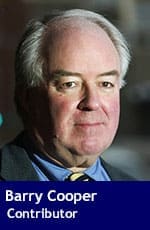 The impact of the chaotic migration from the Middle East to Europe and beyond is more sensed than understood. How, for example, did the migrant crisis come to “dominate debate,” as a recent newspaper headline put it last week, in the Canadian election campaign?
The impact of the chaotic migration from the Middle East to Europe and beyond is more sensed than understood. How, for example, did the migrant crisis come to “dominate debate,” as a recent newspaper headline put it last week, in the Canadian election campaign?
A beginning, if not the beginning, lay in U.S. President Barack Obama’s humanitarian impulse to follow his predecessor in helping the region. In so doing, both leaders disregarded the prudent advice of a great American statesman, John Quincy Adams. America had benefitted humanity, Adams said on July 4th 1821, by abstaining from interfering with others. Most notably, America “goes not abroad in search of monsters to destroy.”
Just as U.S. President George W. Bush sought to destroy the monster Saddam and bring democracy to Iraq, as early as June, 2009, in his Cairo speech, Obama promised to “extend a hand” to corrupt dictators if they would only unclench their fists. Like Bush, Obama called democracy not an American ideal but a human right.
So began his encouragement for what became the Arab Spring. More monsters and near-monsters – Colonel Gaddafi, Hosni Mubarak, Bashar al-Assad – needed to be destroyed.
One obvious and unintended outcome: by 2013 the Islamic State (IS) was in a position to proclaim its bloody rule over parts of Syria and Iraq. And IS brought together the kind of murderous Sunni jihadists previously seen only in al Qaida affiliates with surviving killers from Saddam’s allegedly secular and effectively totalitarian Baathist Party.
In the National Post last weekend, Christy Blatchford and Jonathan Kay debated what a Canadian response might be. Kay argued that Canada ought not to accept more refugees than it can assimilate, a piece of commonsense wisdom first made by Aristotle. Blatchford said Canada can admit many more Syrians than are currently proposed. Both were appalled by the “humanitarian meltdown” in Syria.
My red lines in the sand before accepting more refugees by Pat Murphy
Humanitarian compassion is a limitless democratic sentiment. Others are like me and they are suffering. I want to relieve others from suffering as I, in their position, would like to be so relieved. My moral imagination is at work precisely because I am not suffering, which is also a source of satisfaction. Unlike charitable actions, there is always an element of self-indulgence in humanitarian compassion. So it is with Canadians today.
Here is another issue to ponder.
We all think ourselves immediately and naturally part of humanity, whence flows our humanitarianism. Being Canadians or Syrians is secondary. Indeed, having political affiliations at all is secondary.
But here’s the thing: humanity is simply not political. Humanity is not capable of self-government the way Canada and Syria are. Henry Kissinger once asked: “who do I call when I want to call Europe?” Who does the Prime Minister call when he wants to call humanity?
Here’s another problem. Canadians may feel humanitarian compassion at the suffering of others but not everyone in the world shares that sentiment. That was the unspoken reality behind Jonathan Kay’s caution.
Does this mean caution regarding generous, if not limitless immigration makes us enemies of humanity? And if not, how much generosity is enough? Since the Syrian civil war began, the UN has registered about four million refugees. In other words, the homogeneity that allows Canadians to feel humanitarian compassion is not the same as political unity. In reality, there is not even a humanity in the process of achieving political unity.
One conclusion is that any sensible policy that deals with accepting migrants to Canada or anywhere else will begin not with considerations of their humanity but from a hard-nosed examination of the political interests of the recipient country.
Barry Cooper is a professor of political science at the University of Calgary.
Barry is a Troy Media contributor. Why aren’t you?
The views, opinions and positions expressed by columnists and contributors are the author’s alone. They do not inherently or expressly reflect the views, opinions and/or positions of our publication.


